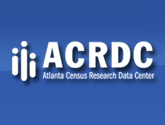Federal Reserve Bank of Atlanta
Atlanta, GA
Atlanta Fed Hosts Conferences on Census Data

The Federal Reserve Bank of Atlanta recently hosted two research conferences that highlighted work based on data from the U.S. Bureau of the Census.
Economists, demographers, and other researchers from universities, government agencies, and nongovernmental organizations convened at the Atlanta Fed's headquarters during the week of September 16–20. Assembling people who otherwise might not interact, and thus advancing research and debate about important economic policy matters, is a core mission of the Atlanta Fed and the Federal Reserve System.
Broad range of research presented
The events showcased research papers informed by data generated from the Census Bureau and other government statistical agencies. The several dozen papers presented spanned a range of subjects, including the impact of the federal Clean Air Act on individuals' earning potential, issues in U.S.-China trade relationships, and the rapid decline of U.S. manufacturing employment after the 2001 recession.
The Atlanta Census Research Data Center (RDC), which is a consortium of several groups and housed at the Atlanta Fed's headquarters, co-hosted the conferences along with the Census Bureau's Center for Economic Studies.
"We were delighted to host the national Census Research Data Center Conference this year," said Julie Hotchkiss, a research economist and executive director of the RDC. "The Atlanta RDC is only in its third year of operation, so we are just ramping up the number of projects being undertaken here. Hosting the conference was a fantastic opportunity to educate the Atlanta research community about the possibilities for research that makes use of nonpublic data available in the Census RDC."
Highlighting the value of data
In a keynote address, U.S. Department of Commerce Undersecretary Mark Doms discussed the value of government data in a time of shrinking federal budgets. Doms contrasted information compiled by public-sector agencies such as the Census Bureau and the Bureau of Labor Statistics with data from private-sector companies and trade associations.
He noted that government data differ in several ways, including:
- It is more comprehensive, as the government has no vested interest in highlighting one group of people or companies;
- It is generally publicly available;
- It is consistent over time, as the agencies do not typically close as a company might, and do not change methods and policies on gathering data; and
- The agencies' methods are open to public scrutiny.
Doms and audience members noted that many for-profit companies generate significant revenue by packaging and selling data such as weather forecasts and demographic statistics that are provided free by government agencies.
The week's second event, the 2013 Comparative Analysis of Enterprise Data Conference, focused on promoting research using "enterprise microdata." Microdata refer to highly detailed information that typically includes every individual person or company record in a survey or research sample. This conference was an opportunity for producers and users of these data, such as statisticians and economists, to gather. It also allowed policymakers to get acquainted with the newest research results and policy implications in this rapidly expanding field.


